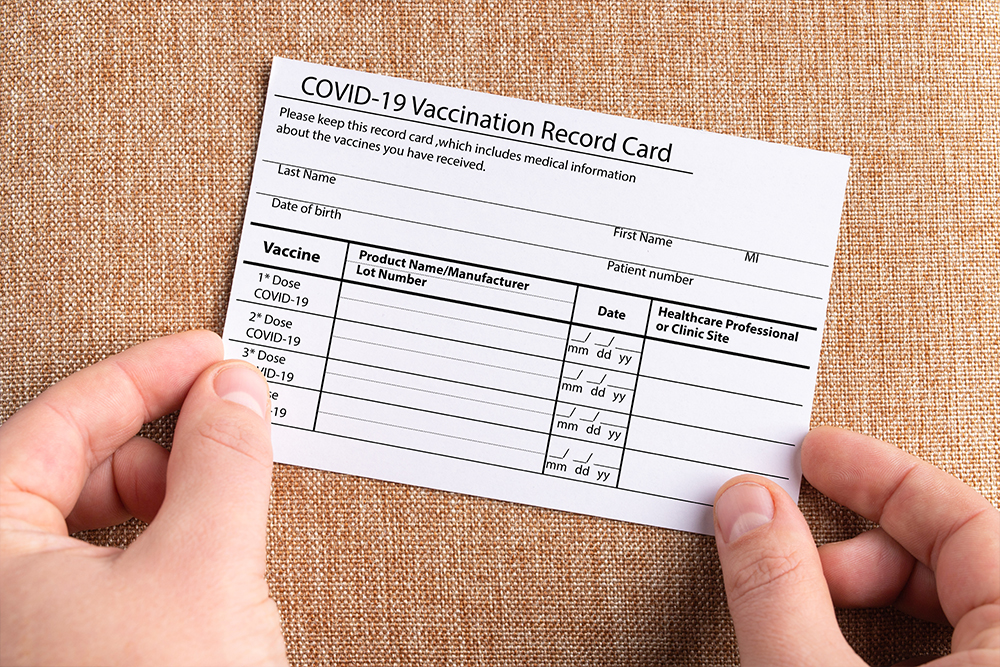At this time, COVID-19 case numbers in the United States are increasing due to the emergence of new variants like the Omicron variant and a number of other factors. To combat the spread, many businesses, schools, and other places now require COVID-19 vaccination records for full participation to help with public health.
Many people are sharing these records by providing what is referred to as a “vaccine card.” What are these cards? Are they necessary? Are they violating HIPPA?
In this article, we’ll explain the INs and OUTS of vaccine cards and how people are using them all around the world.
Card Information
Everyone who receives a COVID-19 vaccination also receives a paper card with some important information about one’s COVID-19 vaccination status.
The first piece of information on the paper lists the type of COVID-19 vaccine you receive, either Moderna, Pfizer, or Johnson & Johnson. To that end, The Center for Diseases Control and Prevention (CDC) states that “the COVID-19 vaccines are not interchangeable.” Therefore, it’s imperative for providers to know which vaccination they administer so patients can know when they will be considered fully vaccinated.
That said, the second piece of information included on these cards is a clear record of the date of vaccination, indicating when someone is considered fully vaccinated. In cases where two shots are required, the CDC recommends people “get the second shot as close to the recommended [3-4 week interval as possible].”
The final piece of information required on the card is the location. This will indicate which clinic or provider administered an individual’s vaccine. It serves to further legitimize the vaccine card.
The information on the COVID-19 vaccine card helps provide important details about vaccination status. However, ensuring that you receive the vaccine card isn’t the only step. There are some other recommendations on what to do after the appointments.
Card Aftercare
Experts recommend that fully vaccinated people take good care of their vaccine cards by following a few tips.
Making copies of your vaccine card is one of the easiest measures you should take first. The CDC even recommends taking a picture of your vaccination card as a backup. This way even if you lose the physical card, you can at least have a photo of it for backup.
It’s best to keep the card in a safe space, just like a credit card or social security card. Do not put the vaccine card in a wallet or purse or post pictures of it on social media. A vaccination card might seem like a fun post to make, but with fake vaccination cards on the rise, it’s important to know who is seeing it.
If the vaccine card is lost, obtaining a replacement card is made simple by contacting your vaccination site where the vaccine was received. Most places will have a digital record making it easy to receive a replacement card.
While currently there is no requirement to have an official record of immunization, guidelines could change in the future. So it’s best to be prepared in case things change.
HIPAA Concerns
With people returning to the office, and positive cases surging around the country, many workplaces are beginning to require proof of vaccination. With this happening all over, many people have privacy concerns about their employer asking for proof of vaccination.
Many places of work require proof of vaccination to work without a face mask, but surprisingly this is not a violation of HIPAA. According to the U.S. Department of Health & Human services HIPAA Article 3028, “The HIPAA Rules do not apply to employers or employment records.” The agency goes on to explain that “[HIPAA] only applies to health care providers, health plans, and health care clearinghouses.”
What this means is that employers can ask employees to provide proof of COVID-19 vaccination, but because they are asking and not demanding, this request is not a HIPPA violation. In other words an employer requiring proof of vaccination for a new employee is not a violation of HIPAA because HIPPA is not applicable to employment.
When The Card Might Be Needed
With the increasing accessibility of vaccines and the itch to travel, more and more people are touring the destination that they could not in 2020 and 2021. In many cases, proof of vaccination is already required to visit.
For example, many cruise lines will now require vaccines and tests due to the surge of cases. Moreover, some destinations such as New York are requiring proof of vaccination or a recent negative test to enter large indoor venues.
And even some normal venues such as concerts or movie theatres may ask to see vaccine cards along with the cost of admission. Additionally, it has been reported that some colleges and universities in the United States require students to be fully vaccinated to even attend classes.
Because so many places have different, contradictory policies about proof of vaccination, it’s best to call ahead and take each individual location’s COVID-19 guidelines into account when researching the travel destination.
How We Can Help
Currently at this time proof of vaccination is not required to travel, but that may change in the future. It’s evident that many areas are adopting these measures through policies and legislation.
You can save yourself the worry now and help out your immune system! At MCR Health we are here to help you, and part of that is getting our community vaccinated! Please contact us for more COVID-19 vaccine information, and to get your vaccine card today.

